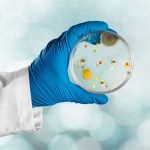Hormones & Autoimmune Arthritis
JENNY BENNETT, ND
It is no secret that autoimmune diseases are more common in women than they are in men. While statistics are continuously evolving as we learn more about autoimmune diseases, it is estimated that approximately 8% of the US population suffers from an autoimmune disease and that 78% of that population is women.1 Inflammatory autoimmune arthritic conditions tend to be especially prevalent in women. According to the Centers for Disease Control and Prevention (CDC), rheumatoid arthritis (RA) is 2-3 times more common in women than in men.2 Systemic lupus erythematosus (SLE) is 10 times more likely to occur in women than men.3
Many theories have been postulated as to why women are more susceptible to autoimmune diseases than men. What we do know, though, is that women tend to produce more antibodies when responding to infection, vaccination, or trauma.4 We also know that women tend to produce more of a TH2-predominant immune response, which may contribute to their increased risk for autoimmunity.5 But why is this? Well, the obvious place to look first is hormonal differences between men and women.
Hormonal Influences on the Immune System
One of the first (and perhaps the most famous) studies to point out a correlation between hormones and autoimmune diseases was the Nurse’s Health Study. The original Nurse’s Health Study, which followed up with women every 2 years, from 1976 to 1990, looked at risk factors and major chronic disease patterns in women. What they found in this original study was that women took oral contraceptives (OCPs) were almost twice as likely to develop SLE (relative risk, 1.9) as those that never used OCPs.6 But it wasn’t just an issue of taking OCPs currently or in the past; the risk was also associated with duration of use.
Many studies have examined how certain reproductive hormones, such as estrogen, progesterone, DHEA, and testosterone, play a role in immune system response. For example, clinical studies have shown that men with RA have a higher-than-normal frequency of low testosterone and DHEA and higher levels of estradiol.7 In women with RA who get pregnant, 50-70% of them show an improvement in symptoms during pregnancy, while 90% of women flare within 3 months postpartum, some of them having symptoms for the first time.8 In SLE patients, estrogen therapies, alone, will increase the risk of disease by 5 times, whereas combined estrogen/progesterone therapies only increase the risk by 2 times.9
In general, we can start to conclude that estrogen is more stimulating of a TH2 or TH17 immune system response (toward autoimmunity),10 as compared to both progesterone and testosterone, which tend to promote more of a TH1-mediated response (generalized inflammation). But it is not quite that simple. What seems to be more important is that proper balances in these hormones are critical for not only reducing the likelihood of autoimmune flares, but also in helping to balance immune system responses, in general.
Estrogen & the Immune System
Estrogen is a powerful immune system regulator, and the relationship between estrogen and the immune system is complex. For many years after publication of the Nurse’s Health Study, numerous studies refuted the idea that estrogen could be immune stimulating. One reason for this was that certain autoimmune diseases, such as RA, tend to worsen when women enter menopause and their estrogen levels decline. Another reason was that pregnant women, who will often go into remission during pregnancy, have higher levels of both estrogen and progesterone during their pregnancy. But a closer look at estrogen’s effects on the immune system shows us a much more complex picture.
Macrophages and lymphocytes contain 2 types of estrogen receptors: ER-α and ER-β. Stimulation of these estrogen receptors on lymphocytes has been shown to enhance cell proliferation and reduce cell apoptosis.7 Estrogen has also been shown to stimulate B-cell proliferation and reduce apoptosis in self-reactive B-cells that stimulate autoimmunity. Estrogen has also been shown to directly stimulate cytokines such as interleukin (IL)-1, IL-6, and tumor necrosis factor (TNF)-α.7,10
A woman’s estrogen metabolism also appears to play an important role. Compared to other estrogen metabolites, the 16α-hydroxylated estrogens (metabolites from 17β-estradiol and estrone) tend to be associated with inflammatory states in those with RA and SLE.7 These metabolites are often found to be significantly increased in the synovial fluid of RA patients in both men and women. Elevated levels of aromatase have also been observed in the synovial fluid of these patients, suggesting that metabolism of estrogen to these metabolites can occur within the joint space itself. Combine this with an increase in estrogen receptors in the synovial fluid, and you have a perfect storm for furthering inflammation.11
Progesterone & the Immune System
Progesterone, on the other hand, appears to downregulate the immune system response. This may actually be the reason for symptom improvement during pregnancy, rather than elevations in estrogen.
Progesterone is made, in part, through the glucocorticoid pathway. In both mice and humans, progesterone has been shown to stimulate some glucocorticoid receptors in immune cells to suppress interferon (IFN)-α production.12 Accordingly, lower levels of IFN-α have been noted in the blood of healthy women during the luteal phase of their ovulatory cycle when their progesterone levels are at their highest. High levels of progesterone have also been shown to suppress the differentiation of TH17 cells as well as help with regulatory T-cell (TReg) differentiation from CD4+ T-cells.12
Less is known about any direct effects of progesterone on B cells. However, it has been shown that progesterone may be able to minimize class switching from IgM to IgG antibodies in certain autoimmune diseases, like SLE.12 These class switches to IgG immune-mediated reactions are what can encourage the development of serious complications, such as lupus nephritis in SLE or synovial destruction in RA.
Testosterone & the Immune System
Testosterone, like progesterone, also appears to downregulate the immune system. It has been widely documented that men with RA often have abnormally high levels of serum estradiol and lower levels of testosterone.13 DHEA levels also tend to be lower in both women and men with RA and SLE.13
In opposition to estrogen, testosterone has been shown to promote apoptosis of macrophages. Mice treated with testosterone also show a reduction in B-cell proliferation, whereas lower levels of serum testosterone lead to significantly elevated levels of B-cell lymphocytes.10
There is also significant evidence that testosterone promotes TH1-mediated immune responses, as indicated by a higher TH1:TH2 ratio of peripheral blood cells in men. Promoting TH1 cell-mediated responses can be beneficial for those with autoimmune diseases, as it decreases reactivity of many of the immune mediators in the adaptive immune response.
This could also be why men are more susceptible to severe complications from infections, as has been observed in the recent COVID-19 pandemic that has hit us this year. A recent study published in April 2020 confirmed that men were significantly more likely to have risks or complications from COVID-19 infection than women.14 Several hypotheses have been proposed, but a likely contributor is the higher levels of testosterone in men, which promote TH1-mediated reactions. Interest in hormone effects on COVID-19 pathogenesis has been so widespread that several clinical trials, such as the Stony Brook Estrogen trial, are giving estradiol patches to those infected with COVID-19 to see if it leads to an improvement in symptoms or a reduction in complications.15
So, What Now?
It is important to understand how reproductive hormones play a role in autoimmune pathogenesis. All patients with autoimmune diseases, especially inflammatory arthritis, should be worked up for hormonal imbalances. Measuring serum, saliva, or urine hormone levels is an option, as well as doing basal body temp’ing in women to look at hormonal changes over time.
Care should also be taken when prescribing hormonal therapies to women. Estrogen-only hormonal replacement therapies should be combined with progesterone therapies to help counteract the inflammatory effect of estrogen, especially if 17-β-estradiol is given. When treating transgender women on estrogen therapy, care should be taken with hormone replacement if they have a history of autoimmune diseases, personally or in their family. This group should also be considered for adjunctive progesterone therapy, which can not only help reduce inflammation, but also help with sleep and anxiety symptoms if present.
Hormone replacement therapy and OCPs in women with SLE or anti-phospholipid syndrome should only be considered if absolutely necessary. These patients are at high risk of thrombosis due to their autoimmune condition, and addition of oral hormones specifically may increase that risk.
But, overall, the most important thing to consider is balancing hormones and the immune system response as a whole. Other hormones, such as cortisol, prolactin, insulin, etc, will also impact the immune system response if imbalanced. Environmental triggers, such as diet, lifestyle, microbial infections, viral infections, and toxic exposure, can all lead to increased stimulation of immune system responses. With all autoimmune patients, a thorough work-up is extremely important.
References:
- Fairweather D, Frisancho-Kiss S, Rose NR. Sex differences in autoimmune disease from a pathological perspective. Am J Pathol. 2008;173(3):600-609.
- Centers for Disease Control and Prevention. Rheumatoid Arthritis (RA). Last reviewed July 27, 2020. CDC Web site. https://www.cdc.gov/arthritis/basics/rheumatoid-arthritis.html. Accessed August 11, 2020.
- Centers for Disease Control and Prevention. Lupus in Women. Last reviewed October 17, 2018. CDC Web site. https://www.cdc.gov/lupus/basics/women.htm. Accessed August 11, 2020.
- Styrt B, Sugarman B. Estrogens and infection. Rev Infect Dis. 1991;13(6):1139-1150.
- Girón-González JA, Moral FJ, Elvira J, et al. Consistent production of a higher TH1:TH2 cytokine ratio by stimulated T cells in men compared with women. Eur J Endocrinol. 2000;143(1):31-36.
- Walker SE. Estrogen and autoimmune disease. Clin Rev Allergy Immunol. 2010;40(1):60-65.
- Cutolo M, Sulli A, Straub RH. Estrogen metabolism and autoimmunity. Autoimmun Rev. 2011;11(6-7):A460-A464.
- Rajagopalan A. Rheumatoid Arthritis in Pregnancy. In: Mankowitz SK, ed. Consults in Obstetric Anesthesiology. New York, NY: Springer International Publishing; 2018: 511-513.
- Rojas-Villarraga A, Torres-Gonzalez JV, Ruiz-Sternberg ÁM. Safety of hormonal replacement therapy and oral contraceptives in systemic lupus erythematosus: a systematic review and meta-analysis. PLoS One. 2014;9(8):e104303.
- Hughes GC, Clark EA. Regulation of dendritic cells by female sex steroids: relevance to immunity and autoimmunity. Autoimmunity. 2007;40(6):470-481.
- Cutolo M, Villaggio B, Seriolo B, et al. Synovial fluid estrogens in rheumatoid arthritis. Autoimmun Rev. 2004;3(3):193-198.
- Hughes GC, Choubey D. Modulation of autoimmune rheumatic diseases by oestrogen and progesterone. Nat Rev Rheumatol. 2014;10(12):740-751.
- Taneja V. Sex Hormones Determine Immune Response. Front Immunol. 2018;9:1931.
- Jin JM, Bai P, He W, et al. Gender Differences in Patients With COVID-19: Focus on Severity and Mortality. Front Public Health. 2020;8:152.
- Rabin RC. Can Estrogen and Other Sex Hormones Help Men Survive Covid-19? April 27, 2020. NY Times Web site. https://tinyurl.com/y49n458j. Accessed September 14, 2020.

Jenny Bennett, ND is a naturopathic doctor, acupuncturist, and founder of Aria Integrative Medicine, an integrative autoimmune clinic in Seattle, WA. She received her Doctorate of Naturopathic Medicine and Masters of Acupuncture and East Asian Medicine from Bastyr University. Prior to medical school, Dr Bennett received her BS in Pharmacological Chemistry from the University of California, San Diego. She is adjunct faculty at Bastyr University and currently teaches Rheumatology for the naturopathic medicine department. She is also the author of Naturopathic Business Basics: A Step by Step Guide to Starting and Running a Naturopathic Business. Facebook: https://www.facebook.com/AriaIntegrative/; Instagram: @Ariaintegrative; Twitter: @Aria_Medicine









